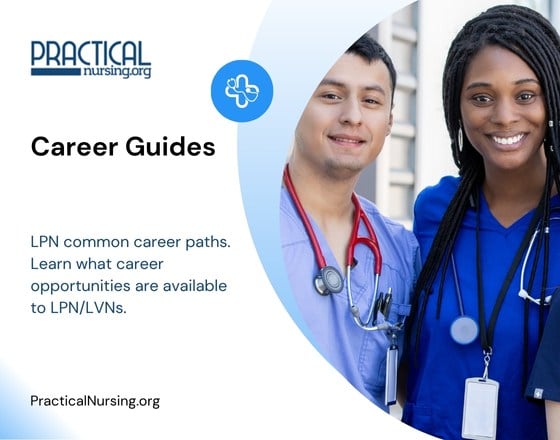Licensed Practical Nurse (LPN) Careers
Licensed Practical Nurses (LPNs) are foundational to the healthcare system, providing essential, hands-on care in a variety of settings. While many LPNs build fulfilling careers in general nursing roles, the profession also offers numerous pathways for specialization. Pursuing a specialty allows you to deepen your clinical expertise, align your work with your passions, and often leads to greater professional satisfaction and increased earning potential.

Written by Jane Dewy and Edited by The PracticalNursing.org Editorial Team.

Common LPN/LVN Career Paths
1. Gerontology (Geriatric Care)
- The Role: Gerontology is the most common specialty for LPNs and is focused on the comprehensive care of older adults. As a geriatric LPN, you are a frontline provider in settings like long-term care facilities, skilled nursing facilities, and assisted living communities. Your work involves managing complex chronic conditions such as diabetes, heart disease, and dementia, administering multi-drug regimens, performing routine assessments, and providing compassionate end-of-life care.
- Essential Skills: Patience, empathy, strong assessment skills to detect subtle changes in a patient’s condition, and expertise in chronic disease management are paramount. LPNs in this field often take on leadership roles, supervising Certified Nursing Assistants (CNAs).
- Career Outlook: With the aging of the baby-boomer population, the demand for skilled geriatric LPNs is exceptionally high and expected to continue growing. This specialty offers significant job security and opportunities for advancement into roles like charge nurse or unit manager.
2. Pediatrics
- The Role: A pediatric LPN provides care for patients from infancy through adolescence. This role is typically based in pediatricians’ offices, outpatient clinics, or schools. Daily responsibilities include administering vaccinations, performing developmental screenings, taking vital signs, collecting specimens, and educating parents on childhood illnesses and wellness.
- Essential Skills: This specialty requires excellent communication skills to effectively interact with both children and their anxious parents. A calm, patient demeanor and the ability to make children feel safe and comfortable are crucial.
- Career Advancement: LPNs can pursue a Pediatric Certification (CPN) to demonstrate their expertise. This can lead to more specialized roles within pediatric clinics or home health agencies that serve medically fragile children.
3. Home Health Care
- The Role: Home health LPNs provide skilled nursing care to patients in their own homes. This role offers a high degree of autonomy, as you will be working independently to manage your caseload. Duties can range from post-operative wound care and medication management for chronic illnesses to providing IV therapy and educating patients on self-care.
- Essential Skills: Strong organizational and time-management skills are a must. You must be an independent problem-solver, comfortable making decisions on your own, and possess excellent patient education abilities.
- Career Outlook: As healthcare increasingly shifts toward keeping patients at home, the demand for home health LPNs is rapidly expanding, offering flexible schedules and the opportunity to build meaningful, long-term relationships with patients.
4. Hospice and Palliative Care
- The Role: This specialty focuses on providing comfort, dignity, and quality of life for patients nearing the end of life. Working as part of an interdisciplinary team that includes RNs, social workers, and chaplains, the hospice LPN is an expert in pain and symptom management. You will administer medications, provide personal care, and offer crucial emotional and psychological support to both patients and their families.
- Essential Skills: This role demands profound empathy, emotional resilience, and exceptional communication skills. The ability to provide compassionate, non-judgmental support during a highly sensitive time is the cornerstone of this specialty.
- Career Advancement: LPNs can obtain the Hospice and Palliative Licensed Practical/Vocational Nurse (HPLPN) certification to validate their skills and advance in this deeply rewarding field.
5. IV Therapy
- The Role: With additional certification, LPNs can become specialists in intravenous (IV) therapy. While state regulations vary, IV-certified LPNs are typically qualified to insert peripheral IV catheters, administer intravenous fluids and certain medications, and monitor patients for complications. They work in hospitals, infusion centers, and skilled nursing facilities.
- How to Specialize: LPNs must complete a state-approved IV therapy certification course, which covers topics like the anatomy of veins, infection control, and managing IV complications. The National Association for Practical Nurse Education and Service (NAPNES) offers a nationally recognized IV Therapy Certification.
- Career Impact: This certification significantly expands your clinical capabilities and makes you a more valuable asset to employers, often leading to higher pay and more diverse job opportunities.
6. Rehabilitation Nursing
- The Role: Rehabilitation LPNs are key players in helping patients recover and regain function after a major illness, surgery, or injury such as a stroke or joint replacement. Working in rehabilitation hospitals and post-acute care centers, you will assist patients with mobility exercises, reinforce therapies taught by physical and occupational therapists, manage complex wound care, and provide continuous encouragement.
- Essential Skills: Patience and a positive attitude are vital, as progress can often be slow. You will need strong motivational skills and the ability to celebrate small victories with your patients on their road to recovery.
7. Correctional Facility Nursing
- The Role: LPNs in correctional facilities provide a wide range of healthcare services to incarcerated individuals in jails and prisons. This challenging environment requires a high level of autonomy and strong clinical judgment. Duties include triage of acute complaints, managing chronic illnesses, medication administration, and responding to medical emergencies.
- Essential Skills: Mental resilience, adaptability, and strong assessment skills are critical. You must be able to work effectively within a secure, structured environment and provide care to a diverse and often underserved patient population.
8. Occupational Health
- The Role: In this specialty, LPNs work in corporate or industrial settings to promote employee health and safety. Responsibilities include treating workplace injuries, conducting pre-employment health screenings, administering vaccinations (like annual flu shots), supporting wellness programs, and helping to ensure compliance with OSHA standards. This role typically offers a regular weekday work schedule.
9. Dialysis Nursing
- The Role: Dialysis LPNs undergo specialized training in nephrology to support patients with kidney failure. Working in outpatient dialysis clinics, their tasks include preparing and monitoring dialysis equipment, taking vital signs before, during, and after treatment, and educating patients on critical dietary and fluid restrictions. This is a highly technical and in-demand field.
10. Clinical Office Specialties
- The Role: LPNs are valuable assets in specialty physician offices, such as dermatology, cardiology, orthopedics, and oncology. In these roles, you develop deep knowledge in a specific area of medicine. Duties often include assisting with in-office procedures, performing diagnostic tests (like EKGs), managing patient education for specific conditions, and coordinating patient care. This path often provides a stable work schedule and the opportunity to become an expert in your chosen field.
How to Advance and Specialize Your LPN Career
Growing your career beyond a generalist role is an achievable goal. The primary pathways to specialization include:
- Gaining Experience: Many specialties are learned on the job. Seek out entry-level positions in a field that interests you to build a strong foundation of experience.
- Pursuing Certifications: National certifications are the best way to formally validate your expertise in a specialty. Organizations like NAPNES and the National Federation of LPNs (NFLPN) offer certifications in areas like Gerontology, IV Therapy, and Pharmacology.
- Continuing Education: Actively participate in continuing education units (CEUs) that are relevant to your desired specialty. This not only fulfills license renewal requirements but also keeps you current on the latest best practices.
- Advancing to an RN: For the greatest increase in scope of practice and career opportunities, many LPNs choose to enroll in an LPN-to-RN bridge program. This educational path builds upon your existing knowledge and is the most direct route to becoming a Registered Nurse.